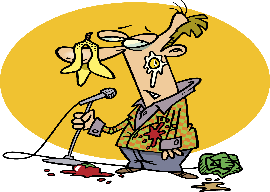
June 10, 2011

Human-rights commissions’ original purpose was to prevent real injustices (i.e., people being denied employment or housing because of their religion, ethnicity, sexual orientation, etc.), and this seems an entirely civilized and reasonable justification for their existence to most people. But somehow they’ve managed to metastasize into a Kafkaesque body, accountable to no one while policing the nation’s comedy clubs to ensure sensitive heckler-management techniques.
How did they become so grotesquely distorted from their original (and basically sane) purpose? One possibility is that, in our highly bureaucratized and wildly litigious society, there are increasingly melodramatic possibilities for self-pity opened up by an ever-expanding definition of “victimhood.” Pardy apparently claimed with a straight (no pun intended) face that she had suffered “post-traumatic stress” as a result of the incident, a phrase which I’d previously thought was normally reserved for shell-shocked war vets.
And then there’s the fact that Canadians don’t enjoy the same speech protections as our American counterparts.
That last one came as a surprise to me. Because of our historical ties to the soggy, soccer-hooligan-infested ex-empire known as Britain, it seems we have a somewhat less officially enshrined tradition of free speech than the Yanks. Having slept through most of my high-school history classes, I’d always assumed that Western democracies were on the same page about this sort of thing. Speaking on the differences in American and Canadian culture regarding free speech, Canadian writer Susan Cole once argued:
We don’t have a First Amendment, we don’t have a religion of free speech….[We] respect diversity, equity, all of the values that Canadians really care about. Those are the things that drive our political culture. Not freedoms, not rugged individualism, not free speech. It’s different, and for us, it works.
Notice the heavy dose of the plural pronouns “we” and “us” in the above fragment. One is sorely tempted to give Tonto’s classic stone-faced reply: “Who’s this ‘we,’ Kemo Sabe?” Ms. Cole has no more right to speak on all Canadians’ behalf than Avril Lavigne or Wayne Gretzky do, but she’s decided for us by proxy that “we” don’t really care about free speech—it’s only another goofy American export, like Jerry Springer and super-size Big Gulps. Her attitude is typical of Canada’s political/cultural elite.
Students of social history will someday look back with bewilderment and wonder how a civilized First World nation such as Canada could actually hold show trials that would be the envy of China or Iran and recalled nothing so much as Eastern European and Russian jokes from the mid-1900s. As an old Soviet favorite from the 1950s goes:
A judge walks out of his chambers laughing his head off. A colleague approaches him and asks why he is laughing.
“I just heard the funniest joke in the world!”
“Well, go ahead, tell me!” says the other judge.
“I can’t—I just gave a guy ten years for it!”